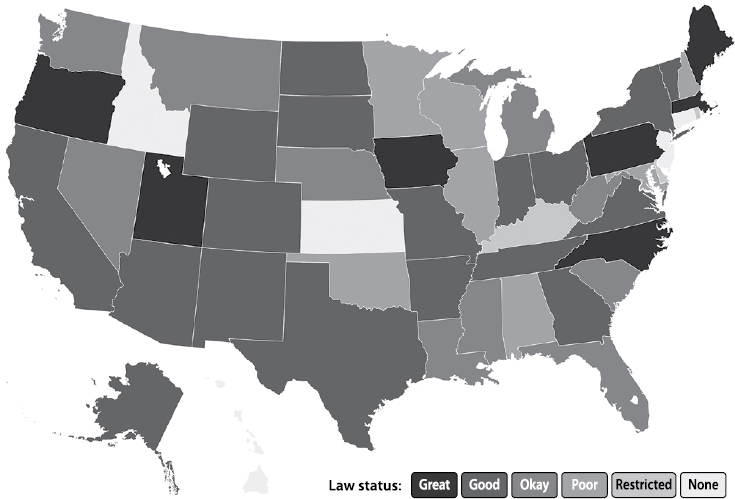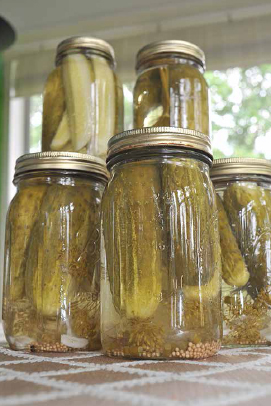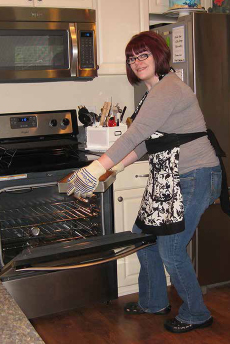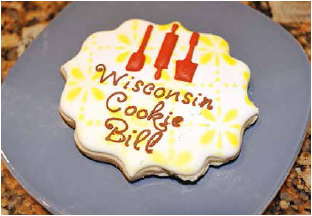
Navigating Your State’s Cottage Food Law

THIS CHAPTER WILL HELP YOU NAVIGATE your state’s cottage food law. If you don’t have such a law that allows you to sell what you’d like to your neighbors, we’ll touch on that, too. At the time of writing, there are eight states and every Canadian province (other than some specific farmer exceptions for sales at farmers’ markets) with no cottage food law at all.
Tips for Understanding a Cottage Food Law
The following tips serve as a guide to understanding your state’s cottage food law.
(1) Review Your State’s Cottage Food Law
Cottage food laws are typically administered by a state’s department of agriculture or whatever department regulates “food production.” This is usually not the same department that regulates and inspects facilities that prepare and serve food, like restaurants or catering operations. In some states that require a kitchen inspection, this would often be administered through the state’s department of health. There’s a big difference between “production” and “preparation” — so much so that each is handled by a completely different department with a completely different set of rules, regulations and procedures.
Another key difference between the two involves “service.” Once you start selling and serving a food item you made, the regulations and requirements immediately become more complex, often involving refrigeration, serving temperatures, food handling, licensing issues and sanitation. Stick to just selling the whole chocolate cake. When you start slicing and selling individual cake pieces along with a fork, you add another layer of regulations and cost. An easy workaround: offer cupcakes if you want to sell individual servings.
In Wisconsin, for example, the Department of Agriculture, Trade and Consumer Protection administers the cottage food law. However, the Wisconsin Department of Health and Human Services administers, inspects and licenses establishments that prepare and serve food to the public, like restaurants, caterers and even our bed and breakfast. Can you see where things can get confusing?
Direct-to-customer or Indirect (Wholesale)
While each state’s cottage food laws vary on multiple levels, every law specifies to whom the product can be sold. This “to whom” then falls into two categories that probably sound familiar: direct and wholesale. Direct means directly to your customer. You, as a baker of brownies, sell some to me, the customer. I pay you directly and then, happily, am the one to eat them, give them as a gift or do whatever else I choose to do with them, as long as I do not resell them.
Indirect sales, sometimes referred to as wholesale, cover a wide range of other sales opportunities. If you live in a state that allows wholesale, you could potentially sell me those brownies and I could then resell them at a venue like my retail store or coffee shop. While you receive a lower price for wholesale transactions, the benefit is higher volume and, hopefully, more regular orders. Brownie sales at the farmers’ market fluctuate and can tank if a summer thunderstorm rolls in. If you know my coffeehouse will buy four dozen brownies a week, you often gross more revenue despite the lower price due to economies of scale and a reliable stream of orders flowing in.
More than a dozen states have passed laws that permit sales on a wholesale level. As an added bonus, these states often permit other food categories like refrigerated baked goods, and generally don’t have a sales cap either. Bottom line to your bottom line if you’re fortunate enough to live in one of these states: you get to create close to a commercial kitchen arrangement without the cost and setup hassle such a facility often entails. In general, however, such states have more upfront requirements, including an on-site kitchen inspection and paperwork. Once you work through these, you can operate under a much wider range of product possibilities.
Sometimes laws legalizing wholesale products produced in home kitchens come bearing names other than cottage food. Instead, they might have the word “home” in the law title. Make sure you know the right way to refer to this classification if you want to pursue it further or call the administering agency for clarification. In Iowa, for example, the law is called a Home Food Establishment; in Maine, one of the first states to institute such a law more than thirty years ago, it’s referred to as a Homestead License. California’s law, passed in 2012, refers to cottage food but breaks it down into two classes of licensing: Class A-licensed operations can only sell direct to customers, but Class B operators have options to sell wholesale.
The consistent variable among states permitting wholesale remains the ability to use a home kitchen in a more commercial capacity. If wholesale interests you, ask about the possibilities, knowing those laws may be defined in ways other than as cottage food.
(2) Stick to Your State as Your Primary Source of Information
In journalism, articles can be sourced from primary or secondary sources. Primary sources are the people, companies or organizations directly involved with the topic; secondary sources are people or organizations that may report about a subject. Primary sources of information are always preferred to secondary sources. That’s one reason why Wikipedia can never be used as a source.
Cottage Food Laws in the United States

Forrager (forrager.com) is an online cottage food community. It contains information about the cottage food laws, includes a directory for cottage food operations, and allows people to connect and share ideas about the industry. MAP COURTESY OF FORRAGER INC (FORRAGER.COM)
As cottage food laws grow in number across the country, websites are popping up to address the hunger for information about them, filling gaps where states often fall short: in providing readily accessible, easy-to-understand content. Such websites can also be a great way to connect with other food entrepreneurs in your state since they might offer an online forum for discussions. The best example is forrager.com.
While cottage food websites are a quick reference point with lots of useful information, avoid basing your information solely off them; they could become outdated, contain factual errors or suddenly disappear one day. In other words, these sites are secondary sources of information, perhaps more valuable to marketing than keeping tabs on what’s happening in your state.
Your state’s current cottage food law should be the only thing to direct the scope of your business. Treat it as your primary source. Remember, you are responsible for the actions of your business. The decisions you make must be based on the law as it stands. Avoid decisions based on what you hear or what someone else may be doing, particularly if it’s in another state.
Throughout this book, we use illustrative examples based on laws that may change in the coming years. Change is constant, especially when it comes to legislatures creating, repealing and amending laws. The great news is that cottage food laws are mostly bipartisan. Both Republicans and Democrats tend to agree on the importance of job creation, employment and encouraging the growth of small business. Where they have a hard time working together and agreeing is on how.
Some states’ cottage food laws are simple and short while others go on and on. These two extremes express two different approaches to writing laws. A shorter, more general law will enable the administering body (i.e., your state’s department of agriculture) to address and answer questions and issues as they come up. A more detailed law aims to answer everything up front but leaves little wiggle room for questions or alternative interpretations. Keep this in mind when reviewing your state’s law.
(3) Tap State Resources to Understand the Law
You only have to deal with and understand your state’s cottage food law. Some states have accessible, user-friendly and easy-to-understand information on their cottage food law. Not all do. Depending on your state, you’ll find yourself either muddling through some technical data and legal verbiage or proceeding easily with clearly defined guidelines and requirements. When in doubt, contact the department or agency directly to sort out issues and get advice on your specific product idea and your next steps.
States that truly embrace cottage food law opportunities couldn’t make it easier, with a checklist approach to guide new food entrepreneurs. In the case of laws about pickles, preserves and other canned products, university extension will often serve as a more objective educational arm and offer various online resources and in-person workshops and consultations. Don’t, however, count on university extension agents giving you the definitive yes or no to your product; they’re not lawyers or administrators of the law, nor may they have a talent for marketing.
In states with more clunky and hard-to-understand information, you’ll need to educate yourself on the more technical terms used in cottage food legislation as it applies to your product.

Quart-sized jars of Inn Serendipity pickles with cucumbers raised on the authors’ farm. JOHN D. IVANKO
If you feel like you’re getting a runaround to your questions from the department handling the cottage food law — or no reply at all — go to the top! Contact your state elected representative and/or senator to see if they or their staffers can help. There’s nothing more powerful to jumpstart a less-than-responsive governmental office than a letter from your representative.
A word of caution, however, when dealing with legislators. You may need to bring your representative up to speed on the cottage food law. In your initial contact, it would be wise to reference the specific law and what you hope to accomplish in their district with your business. Making money and paying some taxes are two good selling points. Most politicians like to hear from their constituents, too. Don’t forget to include your full address (not a PO box) when contacting your representatives.
(4) Follow Your State’s Registration and Review Process
What do you need to do specifically to get your business started? This can vary considerably from state to state. Some states require annual registrations, licensing fees and food safety training. Most require some form of business registration. We cover the seven easy steps to starting up your business in Chapter 11.
Name: Felicia Hill
Business: FH Cakes (Vancouver, Washington)
Website: fhcakes.com
Products: designer cakes
Sales Venues: direct and custom orders
Annual Sales: nearing $15,000 gross sales cap

Felicia Hill pulling a cake out of her oven. COURTESY OF FH CAKES
Self-Taught Cake Maker Doesn’t Make Peanuts
“All I wanted to do was bake a cake for my son,” shares Felicia Hill with a laugh. “I never dreamed it would grow into this.” This determined suburban mom took her young son’s need for a peanut-free birthday cake and channeled it into a thriving business, FH Cakes. Along the way, she pioneered the cottage food industry in the state of Washington.
“Back in 2008, I couldn’t find a bakery in town that was peanut-free and could create any kind of cake for my son, Daniel, who has a severe peanut allergy,” explains Hill. Having no other option than to do it on her own, Hill took on the challenge and signed up for the basic Wilton cake-decorating class at the Michaels craft store chain to learn the basics.
“My first cake creations were horrible. But my husband kept encouraging me to keep practicing. That’s what it took. Keep repeating the techniques and eventually you improve.”
And improve they did. Two months and three practice cakes after the Michaels course, Hill’s transition into the business world came about on bunco night. “I brought a cake shaped and decorated like dice to my regular bunco night with the girlfriends. They loved it and I had three birthday cake orders by the end of the night.” These first cake orders fell into the “practicing for friends” category. After about a year, Hill realized she had consistent orders and moved to a commercial facility, renting a local licensed church kitchen.
“For a small starter business like mine, renting a kitchen didn’t go well. I didn’t have that many orders yet, and the rental fees kept eating away at my profits,” explains Hill, who ended up renting the kitchen for eight months. “My home kitchen is not only convenient, but spotless. I started thinking, why can’t I bake at home?”
That insight led Hill to learn more about the cottage food movement nationally. She called her representative about introducing such a bill in Washington. While her representative offered support, her call, unfortunately, came too late in the legislative season for a bill to be introduced. But by sugar-coated serendipity, it turned out that just the day prior, a different representative had introduced a cottage food baking bill that was already in the legislative system. Hill jumped on this opportunity, helping champion and support the bill through to final passage in 2011. Hill even stood by Governor Christine Gregoire as she signed Washington’s Cottage Food Operations Law into effect.
Unfortunately, it took another year for all the rules and regulations around this law to be worked out. “The law was supposed to take effect ninety days after signing, but our department of agriculture kept getting bogged down in the details. They lacked a budget to make it happen, too.”
After making numerous phone calls, Hill eventually stepped in, showing up at the agency office in person and volunteering her time to keep the administration process going.
“I did a lot of the legwork for our department of agriculture, such as supplying them with several application templates from other states and creating a ‘Frequently Asked Questions’ sheet,” explains Hill. She also supplied feedback and created a website and Facebook page for Washington’s cottage food law, which she still maintains. “I brought the perspective of the cottage food law entrepreneur into the process and could ask the right questions so that the rules and regulations wouldn’t stifle us.”
On the day before July 4, 2012, everything changed for Hill. You might call it “Baking Independence Day.” Hill officially received the first cottage food permit that gave the green light for her business to launch. Hill specializes in allergen-free cakes, with no dairy, tree nuts, gluten, eggs or soy. Her bakery is the only peanut-free kitchen in the Vancouver area, where nearly half of her cake orders are allergen-free.

Felicia Hill with a selection of her decorated cakes. COURTESY OF FH CAKES
“I love a challenge, and when a customer asks ‘Can you make something,’ I’ll always say yes,” Hill shares. This key customer service skill stems from her ability to listen deeply and hear what a potential client asks for. She has an open discussion with every customer, so what she delivers reflects the vision in their mind. It’s not what you want but what the customer wants that matters. As it turns out, the diversity and challenges that come with new designs added to Hill’s satisfaction and enjoyment in operating her business.
“My cake-decorating training came from watching YouTube videos while nursing my second son. There are so many resources out there with cake artists eagerly sharing their tips and techniques.” She also recommends joining Cake Central (cakecentral.com), an online community for cake decorators. After watching techniques, Hill advises to simply practice until you nail it. Today, she loves creating unusual shapes and experimenting with three-dimensional cake designs, such as boats.
Pricing her products initially posed a challenge for Hill. “Looking back, when I started I undersold badly because I thought I needed to charge less because I wasn’t as ‘good’ as other, more experienced cake decorators,” Hill recalls. “I quickly learned that I needed to make a profit if this was going to be a real business and not just a hobby. You have to remember to pay yourself.”
Hill researched online what others were charging and now has a $75 minimum order, with an average sale price of $125 for a small, two-tier cake. More intricate, three-dimensional cakes run around $250, since so much more time goes into making them.
“With cakes, you definitely want to get a website to showcase photos of your work. People want to visually see what you can do,” advises Hill. Word-of-mouth referrals from satisfied customers remain her best advertising. Hill delivers most of her cakes directly, purchasing inexpensive corrugated brown cardboard moving boxes to transport her designs safely.
“My biggest recommendation for folks starting out is, don’t give up,” Hill offers. “I told myself, if I didn’t start turning a profit in three years, I’d shut down, and, sure enough, it took till Year Three to start making money.” Today she averages ten custom cakes a month with a strong repeat clientele. “I don’t want to open a commercial bakery. I love the convenience of being right at home with my family.”
One barrier Hill has encountered is the $15,000 gross sales cap stipulated in Washington’s law. Thanks to her legislative experience, she is looking to the next legislative session to introduce an amendment to the law that increases the sales cap.
Make hard copies of key pages off your state’s website to document the cottage food law in case you’re ever questioned. Just because your state has a law doesn’t mean every state employee, farmers’ market manager or even your local bakery business understands the particulars. You may find you have to educate others — or defend yourself — about what it is that you’re doing. Websites are inherently dynamic; they’re always changing. Create a paper trail and cover yourself.
If you have specific questions on the law as it applies to your business, your best bet is to e-mail the state contact off your state’s cottage food page and receive an answer in writing (again, keep a hard copy). This covers you if there are questions in the future, particularly if these relate to what you can and can’t do under the legislation.
For example, if you’re not sure if a particular product qualifies, send the recipe and receive and document a specific reply. Give this process time. The day before your market is not a good time to call. Even if you need to make a phone call to prompt a reply, get a confirmation via e-mail as well. If you have a discussion with a state representative on the phone, one way to secure a reply is to send them an e-mail outlining what you discussed and the direction you received; then ask him or her to just reply, confirming that you’re on the same page.

Cake pops can be a delicious and unique way to celebrate a special event, or a easy and portable single serving item for a bake sale. JOHN D. IVANKO
Remember two things as you navigate your state’s law: responsibility and perspective. You’re the one ultimately responsible for an accurate interpretation of the law, to the best of your ability. We add “your ability” since you need to feel confident that you have fully researched the legislation and asked enough questions to know that you can sell focaccia or cake pops in your state. Don’t expect everything to be crystal clear or black and white; you may find yourself with varying views from different sources in your state capitol. Do your due diligence and then proceed.
Secondly, carry a savvy businessperson’s perspective. You’re in charge of the cottage food law process. Sure, dealing with bureaucratic agencies and legislation can feel daunting or intimidating. But remind yourself that these often overworked government workers represent institutions that are supposed to be serving you; their salaries are funded by your tax dollars. State agencies serve you, and if you have a less than ideal experience with those administering the cottage food law, make your voice heard. Your opinion and suggestions might improve the path for the next food entrepreneur and may even spark legislative change.
Lobbying for or Amending a Cottage Food Law
If you live in a state with no cottage food law, don’t cave in and give up in despair. Every cottage food law passed in the last decade has resulted from an initial individual citizen organizing others in their state to come together to get the bill passed, with the help of the state representative who sponsored or co-sponsored the bills.
Likewise, if your state law is limited — if, say, you want to sell cookies but your current law only allows you to sell high-acid pickles and preserves — then you too will need to take democracy by the horns and advocate, lobby and amend an existing cottage food law to include such items. Or, depending on your state’s legislative protocol, this expansion may require a full new cottage food law.
Whatever your goal, make sure you have these three elements in your toolkit before diving into the democracy pool:
1. Partnerships
Consider collaboration the yeast that rises to the occasion and brings cottage food legislative change to life. We home cooks harbor business dreams and kitchen expertise, but we lack the deep pockets and big checkbooks others might have to influence politicians. Therefore, we need numbers. Numbers of people, people who vote. We need to demonstrate to our elected representatives the strong and widespread interest in cottage food law and the positive entrepreneurial impact it will have on our state’s economy.
Some key places to seek partners include:
Your State Representatives
Your first call should be to your own representatives. In most states, this consists of two elected officials: one from the state senate and one from the state house of representatives, just like on the federal level. Whether or not you voted for them, these elected officials should be your most loyal champions, since you’re their constituent.
You’ll probably deal with your representative’s aides and not him or her directly. Don’t feel slighted. The legislator’s staff forms the influential group that gets things done in that office. Staffers can also give you a snapshot of any pending cottage food legislation and other history, like past failed attempts at passing a similar bill. Your state representative most likely will have a small staff of a few people. The best option would be to connect with their chief of staff or the person who covers issues related to the department of agriculture or commerce.
Like-minded Organizations
Is there an existing statewide group that could adopt and champion your cause? This will help tremendously to provide both organizational strength as well as legitimacy to your proposed legislation. The more you can prove to representatives that the cottage food movement is a big deal with strong impact potential to your state’s economy, the better your odds. Affiliating with a kindred-spirited non-profit group will help.
This will often be a sustainable agriculture advocacy group, since cottage food fits their mission of supporting family farms. Such an organization may also bring experience in the lobbying front and have a policy or government relation’s person on staff to assist and advise. The Illinois Stewardship Alliance helped shepherd cottage food legislation in that state and we’ve partnered with the Wisconsin Farmers Union in our efforts to expand cottage food law in our state to include baked goods and increase the sales cap.
Potential Cottage Food Entrepreneurs
The pulse of your plan for cottage food law change comes from others just like you: fledgling food entrepreneurs who need this legislation to bring their kitchen business dreams to life. Do a thorough check to see if anyone is already organizing in your state and join forces. Start a Facebook page or webpage to connect and keep an e-mail contact list to get information out in a timely manner, especially when the bill is up for a vote and you need volumes of calls urging support to representatives across the state.
2. Plan
When you gather these partners, particularly your state representatives and kindred organizations savvy in the legislative process, get an immediate sense of the legislative schedule and how your proposed bill fits in. Most state governments operate under a fairly tight and specific schedule dictating when they meet for a vote and approximately how long it takes to shepherd a bill through the vetting process beforehand.
This vetting process often includes committee meetings where the bill is discussed and the pubic is invited to provide testimony. Of particular importance, these committee meetings provide an opportunity to organize supporters who, with their oral and written testimony, influence the committee to support the bill. If the committee does vote for it, the bill then moves to a full vote in either the state assembly or senate. Cue the Schoolhouse Rock song for a review of how your bill will become a law.
3. Patience
Realize your state legislature might only meet once or twice a year to vote on bills. If your bill doesn’t make it through committee in time, it may have to wait a year, only to start the process all over again. The democratic process can really drag. Occasionally, however, bills are “fast-tracked,” usually (in our experience) because the process has been greased by outside campaign donations, political maneuvering or other monetary influences.

Wisconsin “Cookie Bill” cookie, baked and decorated by Shannon Heupel of Artfully Delicious Cookies. JOHN D. IVANKO
The cottage food movement by its very nature does not have big lobbying bucks or deep pockets behind it, so it may creep along like a glacier. We can foster patience and determination while simultaneously advocating and championing the grassroots, people-driven story. Get your inspiring tales of food businesses that such legislation would jumpstart out to the media. Write an op-ed for your local or state newspaper, a sample of which is featured on this book’s website (homemadeforsale.com).
Apply a supersize dose of patience if your proposed legislation fails. Ready yourself for a good fight on the next round. In Wisconsin, for example, we learned this lesson well when advocating for a “Cookie Bill,” proposed legislation to expand our cottage food law to include baked goods and increase the gross sales cap. Despite the fact that our bill received strong bipartisan support throughout the legislative process, passing committees and the full senate unanimously, it did not get onto the agenda for a vote on the assembly floor in the final round. By failing to put it up for a vote, the speaker of the house, who unilaterally sets the voting agenda, used his political position to effectively kill the bill for another year by omitting it from the agenda during the last session.
A blessing in disguise? Regrouping and plotting our strategy to reintroduce the bill next year, we’ll be aiming even higher by increasing the gross sales cap and including greater product opportunities more in line with other states’ cottage food laws. As they say, it’s never over until it’s over.